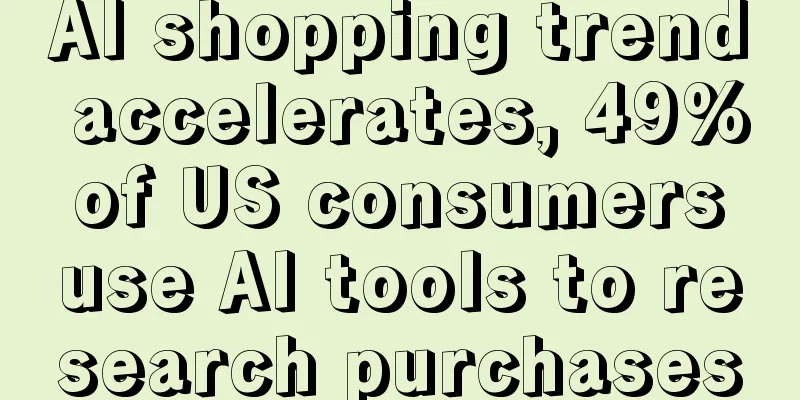AI shopping trend accelerates, 49% of US consumers use AI tools to research purchases

|
It is learned that on March 4, according to foreign media reports, a latest survey shows that nearly half (49%) of American consumers use artificial intelligence tools when researching purchases. This proportion has increased by 6 percentage points from last year, reflecting the growing influence of AI in consumer decision-making. The survey, conducted by consumer research platform Attest and covering 4,000 nationally representative U.S. working-age consumers, showed that ChatGPT remained the most popular generative AI tool at 44%, followed by Google Gemini (31%) and Microsoft Copilot (Bing) (19%). As the trend of AI participating in shopping decisions accelerates, American consumers' trust in AI tools is also rising. The survey shows that 45% of consumers said they trust the information provided by AI chatbots or tools, up from 40% last year. Among them, 17% of respondents even "completely" trust the information provided by AI tools. In addition, American consumers' trust in the information provided by generative AI (42%) is on par with natural search results (42%), and only 15% said that their trust in AI-generated information is lower than that in natural search results. The potential of AI to empower brands has also received attention. Respondents believe that the biggest advantages of brands using AI technology are providing faster customer support (45%), helping employees improve work efficiency (38%), and creating more creative advertisements (38%). In addition, 32% of consumers believe that AI can promote product innovation, 31% believe that AI can improve customer experience, and 29% believe that AI can improve the personalization of services. However, despite the increasing application of AI, consumers are still concerned about the potential risks it brings. The survey found that 56% of respondents are worried that AI will replace human jobs, 54% are worried that brands will lose their "human touch" due to over-reliance on AI, and 53% are uneasy about AI replacing real customer service. Faced with the rapid penetration of AI in the business field, consumers also hope that brands can maintain transparency and control over their use of AI. The survey shows that 79% of respondents support mandatory labeling of AI-generated content, and 75% believe that relevant regulations should be formulated to restrict brands from using consumer data to train AI models. Author ✎ Rayna/ Statement: This article is copyrighted and may not be reproduced without permission. If you need authorization, please contact: happy |
<<: Best Buy's fourth quarter revenue was $13.95 billion, with AOL revenue up 2.6%
Recommend
What is Namshi? Namshi Review
Namshi is a fashion + shopping website in Arab cou...
Amazon Whole Foods will add $10 delivery fee due to high operating costs
Amazon announced on Friday that Whole Foods will c...
Latest Solution | How to deal with differences in shipments?
1. How to deal with the differences in shipments? ...
What is ShareSave? ShareSave Review
ShareSave is Xiaomi's new cross-border e-comme...
About 10,800 pieces have been sold! CPSC urgently recalls this children's socks!
<span data-shimo-docs="[[20,"获悉,据外媒报道,2月9日...
Amazon's major update: Coupon display and rating star changes
Recently, the front-end display of the Amazon pla...
Sellers’ Voice: One Month After FBA Out of Stock
title The small shop that opened last year starte...
The US government wants to remove Amazon’s own products from the shelves! ?
focus on On Amazon, not only do we third-party se...
Does Amazon allow small cards to be placed and reviews to be left with one click?
As Amazon sellers, we are well aware of the import...
Amazon adds new sales ban! These 3 major categories start a new round of compliance!
Normal, once there is data abnormality, such as s...
How can ordinary people become top operators? How can we use correct training to quickly improve our operational level?
Just call me Xiao H. My C position This article is...
What are PopSockets? PopSockets Review
Popsockets is a brand of mobile phone airbag holde...
What is the 616 Global Cross-border E-commerce Festival? 616 Global Cross-border E-commerce Festival Review
The 616 Global Cross-border E-commerce Festival is...
What is Ruelala? Ruelala Review
Ruelala is a website that specializes in limited-t...
I started my own business, but only received 3 orders in half a month for goods worth hundreds of thousands of yuan! I have been preparing for this product for more than half a year, is it all going to go to waste?
Anonymous user My C position My idea is that the c...









